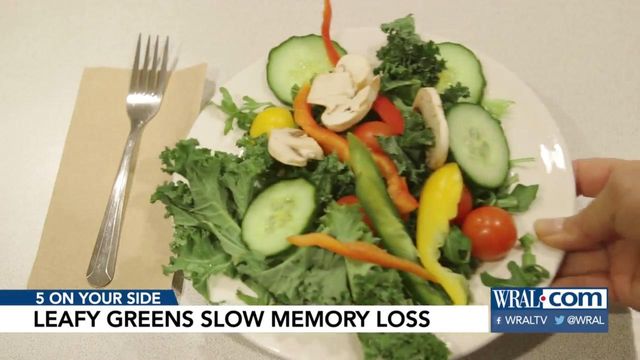New study finds leafy greens could ward off memory loss, Alzheimer's
Many people are familiar with the old adage about an apple a day keeping the doctor away, but new evidence suggests people should eat a salad a day to stay healthy.
Posted — UpdatedMany people are familiar with the old adage about an apple a day keeping the doctor away, but new evidence suggests people should really eat a salad a day to stay healthy.
The new message is that eating a salad, or at least leafy greens, each day might help keep memory loss at bay.
“Just having a salad a day may be one of the keys to brain health," said Consumer Reports Health Editor Trisha Calvo.
The study published in the journal Neurology shows eating leafy green vegetables every day might help preserve memory and thinking skills as people grow older.
“Dark leafy greens are packed with nutrients, like folate, vitamin K and antioxidants, and these all play a role in brain health," Calvo said.
The journal found people who ate leafy greens had brains that functioned as well as people 11 years younger compared to those who ate little or no greens.
“Eleven years is significant, and what this study does is it adds to a growing body of scientific evidence that we can make real changes in our risks for dementia by altering our diets," said Orly Avitzur, Consumer Reports' medical advisor.
Consumer Reports said people don't have to eat bowl after bowl to reap the benefits, though. The brain benefits were seen among people who ate roughly one and one third cups of raw greens a day or about a half-cup of cooked dark, leafy greens.
Avitzur, the magazine's medical director, said the findings could be another tool for helping people stay healthy.
“As the population ages, the numbers of people with dementia rises," Avitzur said. "So, it’s critically important to find effective strategies to reduce the risk of cognitive decline.”
Consumer Reports said several studies support the link between diet and cognitive function, including a host of foods that may reduce your risk of Alzheimer’s disease. Foods such as nuts, berries, beans, olive oil and even a daily glass of wine are all on the menu.
• Credits
Copyright 2024 All Consumer Reports material Copyright 2017 Consumer Reports, Inc. ALL RIGHTS RESERVED. Consumer Reports is a not-for-profit organization which accepts no advertising. It has no commercial relationship with any advertiser or sponsor on this site. For more information visit consumer.org (http://consumer.org/)





